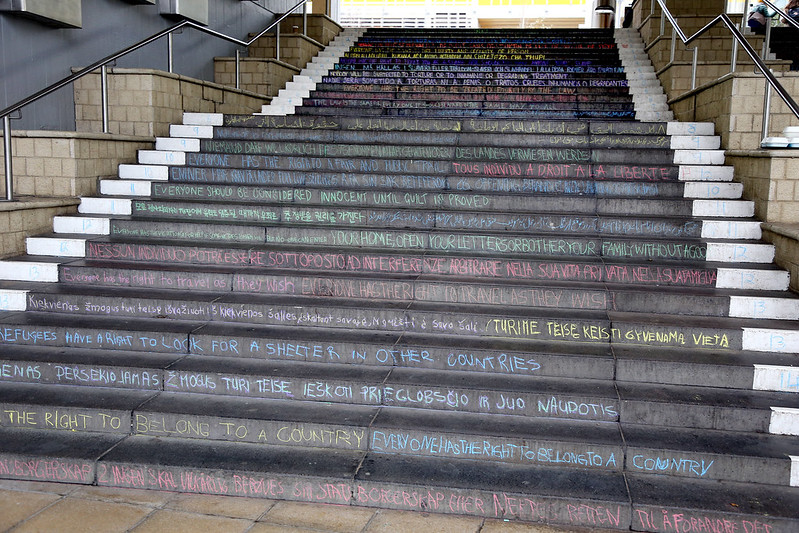In January 2020, Venezuela, Sudan, Mauritania and Libya will join the UN Human Rights Council, after an election that has set alarm bells off around the world, as these are countries known for violating the fundamental rights of their populations. According to Human Rights Watch, these problematic nations should be excluded because of their background, since they do not meet the parameters for membership of the Council.
Venezuela won a chair last October after obtaining 105 votes from member countries, leaving out Costa Rica, a country that had presented its candidacy for that same chair two weeks before in order to prevent a gap in candidates that would let Venezuela win directly. Member states, world leaders and human rights organizations condemned the result since, according to the UN’s own investigations, Maduro’s government is a transgressor of human rights.
The positions are chosen by 193 members anonymously, which means that many take advantage of voting according to political convenience and agreements. According to human rights lawyer Corina Cortés, “there are systems of alliances… gentleman’s pacts, strategic deals, many binational agreements were signed… this generates political loyalty.”
With these results, it is possible to divert attention from the abuses and the disregard of rights in the allied countries and in Venezuela, trying to stop the controls on the denunciations of abuses. “We are going to see a lot of media, a lot of speech and microphone controversy, because that is the way in which Venezuela has managed to position itself before international instances,” points out Cortés.
Maduro’s position should not be underestimated, even if it does not mean directly that the situation will be silenced. Cortés mentions that Venezuela, by assuming its position in 2020, could have an impact on cases like the recent ones in Bolivia or Chile, but it does not mean that it will have a pronounced influence “because this year, the Human Rights Council has been distributed in a certain way, and the country reports and their violation of human rights has been very clear,” so it is hoped that transparency can be imposed on the real work.
The UN Watch initiative
The election does not necessarily mean that Maduro’s regime takes office on the Human Rights Council. UN Watch presented a campaign to expel the country from the Council, based on Article 8 of the General Assembly, which provides that a member who fails to meet minimum requirements and systematically commits serious human rights violations may be suspended.
The campaign has precedents, when in 2011 Libya was suspended from the Human Rights Council. A global signature collection is taking place through the Change.org platform. The initiative condemns the decision to allow the election of Venezuela and tries to reverse the situation, to prevent the perpetrator of human rights violations from being empowered and to avoid victims being ignored.
UN Watch issued an alert through a study indicating that recently elected Mauritania, Venezuela, Sudan and Libya all have troubling backgrounds about the conditions of their citizens and respect for human rights. For example, Mauritania has 500,000 slaves, and out of 193 possible votes, they obtained 172.
In addition to the expulsion campaign, UN Watch proposes voting reforms, eliminating, for example, secret elections that contribute to the exchange of votes among nations. Another formula they propose is the suppression of specific members. International analyst Corina Cortés believes that “there should be a system for nominating candidates… there should be sanctions for all those countries that have suspended the High Commissioner’s annual human rights assessment… they should not have the right to run for council membership.”
What is happening in Venezuela in relation to human rights?
Maduro has been repeatedly linked to abuses of power and human rights violations. In the country, 4.6 million people have emigrated in recent years in search of better living conditions. The largest diaspora that Latin America has lived has occurred because of the political, social, economic crisis and humanitarian emergency.
A few days before the election, more than 50 organizations worldwide spoke out to express that Venezuela is not morally suited to being part of the Council. Although no state is perfect, and some have registered worrying living conditions and clear violations of human rights, the biggest controversy and contradiction is created because the United Nations itself opened an investigation into the Maduro regime.
In the report of the United Nations High Commissioner for Human Rights, Michelle Bachelet, it is determined that security forces committed extrajudicial executions, torture, arbitrary detentions, political persecution and repression. A precedent was created with the document presented by Bachelet in which it was revealed that the state has not guaranteed social, economic, political, civil and cultural rights.
The High Commissioner visited hospitals and other state institutions to corroborate the situation. In these places, she received many complaints from citizens and was able to observe the reality first hand, which led to the assurance that Venezuela is not complying with the rights to health care, and food, among others. The report has not been the only one in which the serious situation in Venezuela has been condemned, and different international and local human rights organizations have denounced and shown concern throughout the years.
Image credit: University of Essex

